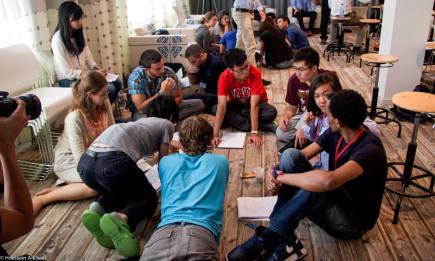Tomorrow’s luminous stars

“Studying is often about exams, universities don’t care too much about how you do it”, says one of the participants of this year’s STeLA-forum. “It can be tempting to opt for the short term success at the expense of your health or your friendships. You can study all night to get that good grade and think about nothing else.”
The emphasis of studying often lies on deadlines and good grades. But when students then enter their jobs, they often need other skills than the ones they learned in university.
STeLA is an international network aimed at developing outstanding students’ leadership skills by organizing a challenging annual forum. The forum – that this year takes place in Delft – focuses on personal development through intensive feedback. Excellent students from universities worldwide are brought together to form a lasting network, ready to tackle global issues.
The Buddhist definition of work
Last year the STeLA students tackled ‘natural disasters’; this year ‘megacities’ are on the programme. Apart from these topics, there is much about ‘patterns of transformation’, ‘shared visions’ and ‘personal growth’.
For instance during the presentation of Paul Hughes, who got the students thinking with his presentation in drawings. “This is the Buddhist definition of work: using our capacities in a common task that reduces our ego and creating products for a becoming existence.”
“This entails the ‘end of management’ as we know it. Managing becomes leading, encouraging, facilitating. Today’s function of leadership is to serve, because we are entering a new world with new rules and new roles.”
The STeLA-students appreciated Hughes’ insights, although some were critical. “The management guru-type of guy sometimes gets on my nerves”, said one of them. “They present very common ideas as new insights. I liked the team-sessions better.”
Link to excellence programme
Professor Peter Wieringa, Vice Rector at Delft University of Technology, is enthusiastic about the international forum the students organized themselves. “I’ve been an ambassador of STeLA for some time now. Our students became involved through our contacts in Japan. The STeLA-forum fits in well with our own excellence programme.”
“We think that leadership development is an important part of higher education. A percentage of the Delft graduates gets a leadership position afterwards, that makes personal development an important part of the curriculum.”
Meest Gelezen
Wederom intimidatie van journalisten door universiteit, nu in Delft
‘Burgerschapsonderwijs moet ook verplicht worden in hbo en wo’
Raad van State: laat taaltoets nog niet gelden voor hbo-opleidingen
Vrouwen houden universiteit draaiende, maar krijgen daarvoor geen waardering
Extra geld voor bètafaculteiten is daar nooit terechtgekomen

